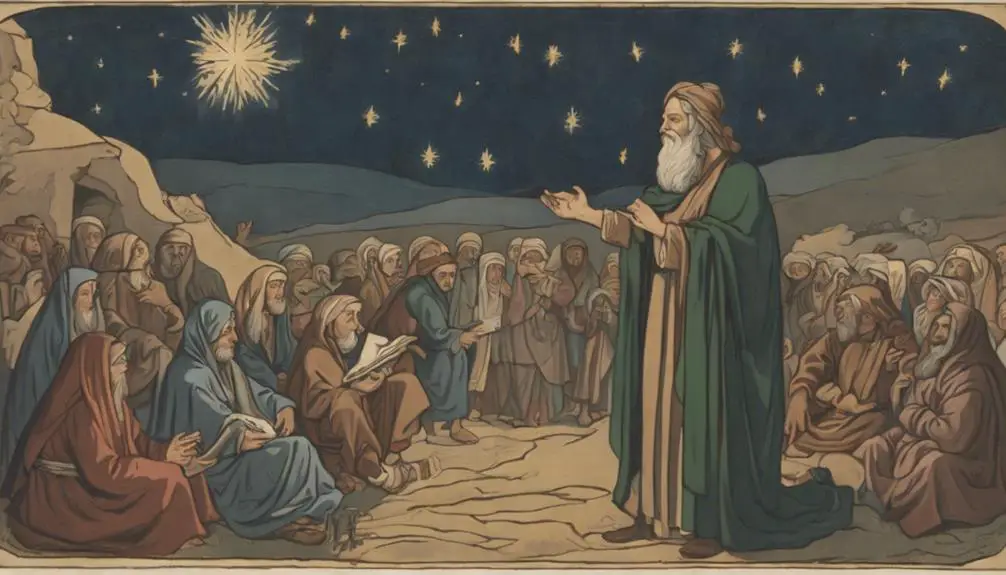Probe into 1 Samuel 9 with intriguing Bible study questions, unraveling Saul's unexpected call to kingship and Samuel's pivotal role in Israel's history.

1 Samuel 9 Bible Study Questions
Imagine Saul, armed with a GPS, on a quest to find his father's donkeys. As you navigate through 1 Samuel 9, questions may arise about Saul's unexpected call to royalty or the role of Prophet Samuel.
You might also ponder on the divine intervention that led to Israel's first king. So, let's unpack this chapter together, exploring its implications and the key lessons it offers.
Ready to embark on this journey of discovery?
Key Takeaways
- Understanding the pivotal role of Prophet Samuel in Saul's anointing and Israel's transition to monarchy.
- Reflecting on God's sovereignty and divine intervention in the seemingly mundane events of 1 Samuel 9.
- Grasping the historical and spiritual significance of Saul's anointment as Israel's first king.
- Learning from Saul's journey about obedience, trust in God's wisdom, and recognition of divine providence.
Understanding Saul's Call

To fully grasp Saul's call in 1 Samuel 9, you'll need to delve into the cultural, historical, and theological layers of the text, acknowledging its intricacies and complexities. In a period marked by political and religious upheaval, Saul's anointing as king wasn't a simple power shift, but a significant paradigm change in Israelite society.
You must grapple with the radical shift from theocratic Judges to a monarchical system, reflecting a significant evolution in Israel's national identity. This wasn't merely a political change—it carried deep theological implications, symbolizing a rejection of God's direct rule.
Saul's character also deserves careful scrutiny. His humility, showcased in his initial reluctance to accept kingship, contrasts starkly with his later actions. This highlights the perilous nature of power, a recurring theme throughout biblical narratives.
Understanding Saul's call also means diving into the symbolism of the lost donkeys. They weren't a mere plot device—they represented Israel's lost state, their need for guidance, and the impending shift in leadership.
Exploring Prophet Samuel's Role

In unraveling Prophet Samuel's role, you'll find he's not merely a secondary character but a pivotal figure in Saul's anointing and the subsequent shift in Israel's political and religious landscape. Samuel was chosen by God to direct Israel's transition from a period dominated by judges to one ruled by kings. He wasn't just a prophet; he was also a judge and a priest, providing spiritual guidance and leadership to the Israelites.
To fully grasp the significance of Samuel's role, let's break it down into three facets: his prophetic role, his priestly duties, and his position as a judge.
Role |
Duties |
Impact on Israel |
|---|---|---|
Prophet |
Convey God's messages to the people |
Guided Israelites in God's ways |
Priest |
Lead religious rituals and prayers |
Ensured spiritual growth and adherence to God's laws |
Judge |
Make decisions on disputes, provide leadership |
Maintained social order, guided political transition |
This table shows the interplay of these roles in Samuel's life. His prophetic role was pivotal in anointing Saul, the first king, subsequently transforming the political landscape of Israel. His priestly and judicial roles ensured the people were spiritually grounded and socially stable. This comprehensive understanding of Samuel's roles helps us appreciate his contributions to the Israelite society.
Divine Intervention in 1 Samuel 9

Having explored Samuel's multifaceted role, let's now turn our attention to the divine intervention that marks the pivotal ninth chapter of 1 Samuel.
In this chapter, we see God's hand guiding events to bring about His divine plan. The narrative begins with Saul's seemingly mundane task of searching for his father's lost donkeys. However, through God's providence, this simple task leads Saul to meet the prophet Samuel. It's worth noting that Samuel had received a revelation from God the previous day about the arrival of a man from Benjamin, who'd be anointed as the leader of Israel.
God's divine intervention is evident in the 'coincidental' meeting of Saul and Samuel. The orchestration of events, from Saul's task to his encounter with Samuel, signifies God's active role in human affairs. God's guidance doesn't just involve major events or miracles, but also everyday occurrences.
In this chapter, the divine intervention is subtle yet profound, reminding us that God's plans are often unveiled in ways we mightn't expect. This is a clear demonstration of Proverbs 16:9, 'A man's heart deviseth his way: but the LORD directeth his steps.' Divine intervention, therefore, isn't merely an abstract concept but a reality woven into the fabric of everyday life.
Implications of Israel's First King

As we delve into the implications of Saul's anointment as Israel's first king, it's crucial to grasp the profound shift this event marked in the nation's history and spiritual journey. Before Saul, Israel was a loose confederation of tribes with God as their sole king. Saul's anointment, therefore, represented a departure from the direct theocracy that characterized Israel's governance.
The implications are multi-faceted. On one hand, Saul's reign was a response to the people's demand for a king 'like all the nations' (1 Sam 8:5). It's indicative of Israel's desire for unity and stability, perhaps even a longing for worldly respectability. Yet, it also signifies a rejection of God's kingship, a move that was fraught with spiritual consequences.
Furthermore, Saul's kingship introduced a new dynamic in the relationship between God, the king, and the people. God remained sovereign, but the king was to rule under God's authority, and the people were to obey the king. This tripartite relationship, if properly maintained, could lead to prosperity and security. However, it also presented potential pitfalls, such as the temptation for the king to abuse his power or for the people to idolize the king.
Key Lessons From 1 Samuel 9

Building on this understanding of the implications of Saul's kingship, let's now examine the key lessons we can glean from 1 Samuel 9. In this chapter, we see God's sovereignty unveiled in a striking manner. Despite Saul's apparent lack of qualities fit for a king, God chose him to lead His people. This teaches us that God's choices often defy human expectations, reminding us not to judge by outward appearance alone.
Also, this chapter highlights the importance of obedience. Saul's initial compliance with Samuel's instructions is commendable, yet as we'll see in later chapters, his eventual disobedience cost him his kingship. It's a sobering reminder to persist in obedience, even when it's difficult or doesn't make sense.
Lastly, we learn about God's providence. The seemingly random events leading to Saul's meeting with Samuel were, in fact, orchestrated by God. This reminds us that nothing happens by chance in our lives, but everything is under God's control.
These lessons from 1 Samuel 9, while rooted in ancient history, remain relevant today. They challenge us to trust in God's wisdom, persist in obedience, and rest in His providence.
Conclusion
In dissecting 1 Samuel 9, you've explored Saul's call, Samuel's prophetic role, and the divine intervention that played out. You've grasped the implications of Israel's first king and extracted key lessons.
This study not only deepens your understanding of Biblical narratives but also encourages you to reflect on your own faith journey. Keep probing, keep questioning, and keep seeking wisdom in the Word, for it's a wellspring of life-changing insights.



Sign up